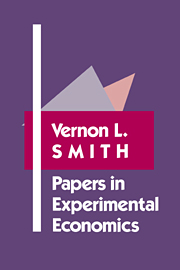Book contents
- Frontmatter
- Contents
- Preface
- Acknowledgments
- Part I The Formative Years
- Part II Institutions and Market Performance
- Part III Public Goods
- Part IV Auctions and Institutional Design
- Introduction
- 25 Incentives and Behavior in English, Dutch and Sealed-Bid Auctions
- 26 Theory and Behavior of Single Object Auctions
- 27 A Test that Discriminates Between Two Models of the Dutch-First Auction Non-Isomorphism
- 28 Theory and Behavior of Multiple Unit Discriminative Auctions
- 29 Theory and Individual Behavior of First-Price Auctions
- 30 A Combinatorial Auction Mechanism for Airport Time Slot Allocation
- 31 Designing ‘Smart’ Computer-Assisted Markets
- PART V Industrial Organization
- Part VI Perspectives on Economics
31 - Designing ‘Smart’ Computer-Assisted Markets
An Experimental Auction for Gas Networks
Published online by Cambridge University Press: 06 July 2010
- Frontmatter
- Contents
- Preface
- Acknowledgments
- Part I The Formative Years
- Part II Institutions and Market Performance
- Part III Public Goods
- Part IV Auctions and Institutional Design
- Introduction
- 25 Incentives and Behavior in English, Dutch and Sealed-Bid Auctions
- 26 Theory and Behavior of Single Object Auctions
- 27 A Test that Discriminates Between Two Models of the Dutch-First Auction Non-Isomorphism
- 28 Theory and Behavior of Multiple Unit Discriminative Auctions
- 29 Theory and Individual Behavior of First-Price Auctions
- 30 A Combinatorial Auction Mechanism for Airport Time Slot Allocation
- 31 Designing ‘Smart’ Computer-Assisted Markets
- PART V Industrial Organization
- Part VI Perspectives on Economics
Summary
We study a sealed bid-offer auction market for simultaneously pricing natural gas at each delivery outlet, source, and on all pipelines that connect sources with delivery points. Wholesale buyers submit location-specific bid schedules for amounts of delivered gas at corresponding prices. Wellhead owners submit location-specific offer schedules for amounts of produced gas they are willing to sell at corresponding offer prices. Pipeline owners submit leg-specific schedules of transportation capacity they are willing to commit at corresponding prices. A computer algorithm maximizes total gains from exchange based on the submitted bids and offers and determines allocations and non-discriminatory prices at all nodes.
As a consequence of technological economies of scale in pipeline transportation, natural gas has been considered a classic case of natural monopoly. But entry, growth and development in the industry in the United States has yielded more than one pipeline in most producing fields. Similarly most wholesale markets are served by at least two pipelines [Norman (1987)]. The concept of natural monopoly is a static concept; i.e. given any level of demand, declining long run marginal planning cost implies that one pipeline - a very large one, if demand is high – yields the least-cost solution to satisfying that demand. But in fact demand is cyclical and tends to grow over time, and new gas wells and gas fields develop over time.
Information
- Type
- Chapter
- Information
- Papers in Experimental Economics , pp. 678 - 702Publisher: Cambridge University PressPrint publication year: 1991
Accessibility standard: Unknown
- 5
- Cited by
